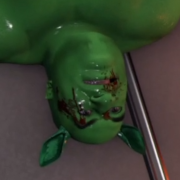|
Gaius Marius posted:You living in Chicago or something? My building was built in 05. I can't imagine ever paying more than $1200 for an apartment, I could buy a house for that much a month I'm paying 1700 for a 2BR apartment out in socal suburbia. When I tell my friends how much I'm paying, they are blown away by how cheap it is. 
|
|
|
|

|
| # ? May 31, 2024 01:17 |
|
Devils Affricate posted:Yeah I wouldn't go so far as to say rural America is more expensive than urban Japan, Regardless of how much money you need to make to live in rural America, how are you going to make money in rural America?
|
|
|
|
Devils Affricate posted:I'm paying 1700 for a 2BR apartment out in socal suburbia. When I tell my friends how much I'm paying, they are blown away by how cheap it is. That is cheap mine is 2900 for a 2br in SoCal.
|
|
|
|
3D Megadoodoo posted:Regardless of how much money you need to make to live in rural America, how are you going to make money in rural America? It's not all that hard if you learn a trade. My buddy was making bank as a welder before he hosed that up
|
|
|
|
true, tradespersons can ply anywhere and make if not a great living at least a decently comfortable one. go, and be the famous american plumber in your favorite east asian country. god could you imagine the commercials
|
|
|
|
Eh. A lot of the locals in Asia hate it when foreigners show up and start laying pipe.
|
|
|
|
Grand Fromage posted:Eh. A lot of the locals in Asia hate it when foreigners show up and start laying pipe. And as Haier taught us, they also seem to hate foreign plumbers
|
|
|
|
McGavin posted:It's okay because it's actually a 200-year-old philosophy, it just has the framing metaphor of a 12-year-old. You've been on a roll, lately
|
|
|
|
Grand Fromage posted:Eh. A lot of the locals in Asia hate it when foreigners show up and start laying pipe. i walked right into this one
|
|
|
|
Luckily Chinese locals make a good peanut brittle
|
|
|
|
Gaius Marius posted:It's not all that hard if you learn a trade. My buddy was making bank as a welder before he hosed that up What'd they do?
|
|
|
|
Fur20 posted:true, tradespersons can ply anywhere and make if not a great living at least a decently comfortable one. If you’re willing to travel for projects as a pipefitter, boilermaker or electrician you can make absolutely stupid money, not just a decently comfortable living.
|
|
|
|
Ugly In The Morning posted:If you’re willing to travel for projects as a pipefitter, boilermaker or electrician you can make absolutely stupid money, not just a decently comfortable living. I wish I'd known boilermaking was a real profession when I'd graduated high school twenty years ago. Hell, even when I finished as an undergrad I would've considered it.
|
|
|
|
Thanks goons for reminding me about some cool and important history. https://encyclopedia.ushmm.org/content/en/article/polish-jews-in-lithuania-escape-to-japan Polish Jews in Lithuania: Escape to Japan Background The German attack on Poland in September 1939 trapped nearly 3.5 million Jews in German- and Soviet-occupied territories. In late 1940 and early 1941, just months before the Germans initiated the mass murder of Jews in the Soviet Union, some 2,100 Polish Jews found temporary safe haven in Lithuania. Few of these refugees could have reached permanent safety without the tireless efforts of many individuals. Several Jewish organizations and Jewish communities along the way provided funds and other help. But the most critical assistance came from unexpected sources: representatives of the Dutch government-in-exile and of Nazi Germany's Axis ally, Japan. Their humanitarian activity in 1940 was the pivotal act of rescue for Polish Jewish refugees temporarily residing in Lithuania. Leaving Lithuania The pressure on Polish Jewish refugees to leave Lithuania intensified in late 1940, when—after the Soviet takeover—the government ordered all refugees to declare Soviet citizenship or face exile to Siberia as "unreliable elements." Encouraged by the reports of those who traveled safely on the Trans-Siberian Railroad to the eastern port of Vladivostok, hundreds of Jewish refugees applied for Soviet exit visas. It remains unknown why the Soviets allowed refugees with Polish travel papers, many of dubious validity, to leave. Not all refugees helped by the Dutch acting consul (Jan Zwartendijk) and Japanese acting consul (Chiune Sugihara) in Kovno left Lithuania for Japan. Some lacked the American dollars the Soviets demanded for the expensive railroad ticket. In the end, the Soviets granted permission to leave in an arbitrary manner. The Soviets even allowed refugees with only a Japanese visa to exit from Soviet territory. But most Lithuanian nationals did not apply for emigration. Under Communist rule they were Soviet citizens and accordingly were denied such freedom. Trans-Siberian Train Journey Between July 1940 and June 1941 about 2,200 Jewish refugees left Lithuania for Moscow, where they boarded the Trans-Siberian train. Most refugees stayed at the Hotel Novo Moskovskaia (New Moscow) during the brief stopover in Moscow. The Trans-Siberian train left Moscow twice a week. The American Jewish Joint Distribution Committee had the onerous task of choosing a limited number of refugees whom they could help by underwriting all or part of the $200 cost of an Intourist ticket for the train passage to Vladivostok. Despite their many anxieties, most refugees felt like tourists on the train. When the train stopped at a settlement in the thinly populated Jewish autonomous region of Birobidzhan, close to the Manchurian border, many refugees spoke briefly with local Jews selling goods at the station. Arrival in Japan The Soviets confiscated currency and other valuables before the refugees boarded Japanese steamers in the port of Vladivostok. When the Jewish refugees reached Japan, most were destitute and lacked documents enabling them to proceed. With the consent of Japanese authorities, a representative of the Jewish community of Kobe met the refugees in Tsuruga and accompanied them on the train to Kobe. Using funds largely from the Joint Distribution Committee, the Jewish community—led by Anatole Ponevejsky—set up group homes, arranged for housing and food, and interceded on behalf of refugees in dealings with local officials. Bogus visas to the Dutch colony of Curacao in the Caribbean that had enabled the refugees to leave the Soviet Union proved useless for proceeding beyond Japan. Needing valid destination visas, the refugees made the round of consulates in Kobe, Yokohama, and Tokyo. More than 500 Polish Jews succeeded in obtaining US visas before December 1941, but new war-related immigration restrictions barred hundreds of others sponsored for entry. The State Department, for example, barred the issuing of visas to refugees with relatives in Axis-occupied territories. Certificates for entering Palestine were even scarcer and arrangements for traveling more complicated and expensive. A minority of the refugees proceeded quickly to the United States and other countries. For hundreds of others the stay in Japan stretched from weeks into months. Many refugees despaired of ever obtaining final destination visas at the US and other consulates they visited. Most Polish Jewish refugees stayed in Japan much longer than their transit visas allowed. Many dreaded the day when authorities would no longer issue permits legally extending the period of residency. The refugees remained concerned about family members in Poland from whom they had been separated. Postcards from home provided some comfort, but most communication by mail or telegram ceased after June 22, 1941, when German forces invaded the Soviet Union. Between June 22, 1941, and the defeat of Germany in 1945, the Germans killed more than three million Polish Jews. The refugees in Japan, however, knew little of this beyond vague rumors. The Japanese public was hospitable toward the Jewish refugees in Japan. The Japanese were also intrigued; yeshiva (religious academy) students appeared particularly foreign. In Kobe, the refugees caught the interest of the avant-garde Tanpei Photography Club, whose members took photographs of many of the refugees in late April 1941. After the war, most refugees remembered the curiosity of the Japanese and noted the absence of antisemitic attitudes and behavior that they had endured in prewar Poland. By the fall of 1941, more than 1,000 of the Polish Jewish refugees had left Japan. Nearly 500 sailed for the United States. Small groups gained permission to enter Canada and other British dominions. Close to 1,000 people remained stranded, having failed to secure any destination visas. In July 1941, the United States imposed an embargo on oil exports to Japan. Soon thereafter, Japan occupied French Indo-China. The refugees' nervousness mounted at the sight of military exercises in Kobe, a major naval base, as war in the Pacific loomed. As Japan prepared for war in the weeks before its attack on Pearl Harbor, police cleared the military port of Kobe. From mid-August to late October 1941, they deported the rest of the refugees to Shanghai in Japanese-occupied China. https://encyclopedia.ushmm.org/content/en/article/chiune-sempo-sugihara?series=8 Chiune (Sempo) Sugihara Chiune (Sempo) Sugihara (January 1, 1900-1986) was the first Japanese diplomat posted to Lithuania. He was born to a middle-class family in Japan's Gifu Prefecture on the main Japanese Island of Honshu. Sugihara is sometimes also referred to as "Chiune," an earlier rendition of the Japanese character for "Sempo," part of his formal name. Sugihara graduated from the exclusive Harbin Gakuin, Japan's training center for experts on the Soviet Union. As the director of the foreign ministry in Manchukuo, a puppet state Japan had established in Manchuria under Japanese supervision, Sugihara negotiated the purchase of the North Manchurian railroad from the Soviet Union in 1932. Because Sugihara was fluent in Russian, the Japanese sent him to the Lithuanian capital, Kovno, in November 1939. He had learned the language from Russian emigres during 16 years in Harbin, Manchuria. He was ordered to provide Japan with intelligence on Soviet and German troop movements in the Baltic region. Sugihara also exchanged information with members of the Polish underground in Lithuania and issued them visas for transit through Japan in 1940. He recognized the urgency of the situation in Lithuania following the occupation by Soviet forces in June 1940 and the accompanying wave of arrests by Soviet secret police. Sugihara may also have realized that, with western Europe engulfed in war, the most likely avenue for escape for refugees in Lithuania was an eastern route through the Soviet Union to Japan. In the summer of 1940, when refugees came to him with bogus visas for Curacao and other Dutch possessions in America, Sugihara decided to facilitate their escape from war-torn Europe. In the absence of clear instructions from Tokyo, he granted 10-day visas for transit through Japan to hundreds of refugees who held Curacao destination visas. Before closing his consulate in the fall of 1940, Sugihara even gave visas to refugees who lacked all travel papers. After Sugihara had issued some 1,800 visas, he received a cable from Tokyo reminding him: "You must make sure that they [refugees] have finished their procedure for their entry visas and also they must possess the travel money or the money that they need during their stay in Japan. Otherwise, you should not give them the transit visa." In his response to the cable, Sugihara admitted issuing visas to people who had not completed all arrangements for destination visas. He explained the extenuating circumstances: Japan was the only transit country available for those going in the direction of the United States, and his visas were needed for departure from the Soviet Union. Sugihara suggested that travelers who arrived in the Soviet port of Vladivostok with incomplete paperwork should not be allowed to board ship for Japan. Tokyo wrote back that the Soviet Union insisted that Japan honor all visas already issued by its consulates. By the time Sugihara left Lithuania he had issued visas to 2,140 persons. These visas also covered some 300 others, mostly children. Not everyone who held visas was able to leave Lithuania, however, before the Soviet Union stopped granting exit visas. Sugihara left Lithuania in early September 1940. The Japanese transferred him to Prague in Bohemia and then to Bucharest, Romania, Germany's ally, where he remained until after the end of the war. During the victorious Soviet army's march though the Balkans in 1944, the Soviets arrested Sugihara together with other diplomats from enemy nations. Soviet authorities held him and his family, under fairly benign conditions, for the next three years. When Sugihara returned to Japan in 1947, the Foreign Ministry retired him with a small pension as part of a large staff reduction enacted under the American occupation. Sugihara held a variety of jobs after the war including one for a Japanese trading company in Moscow from 1960 to 1975. Shortly before his death, Yad Vashem, the Holocaust Martyrs' and Heroes' Remembrance Authority in Israel, declared Sugihara "Righteous Among the Nations" for his aid to the refugees in Lithuania during World War II. Yad Vashem conferred the title in 1984, honoring the former Japanese consul with a ceremony in Jerusalem in January 1985.
|
|
|
|
Ugly In The Morning posted:If you’re willing to travel for projects as a pipefitter, boilermaker or electrician you can make absolutely stupid money, not just a decently comfortable living. In the US, this usually means living in North Dakotas or Alaska for 6 months out of the year. One of my buddies is a senior mechanic for a natural gas company and he makes almost mid 6 figures and gets 5 months of vacation a year. The later part is more impressive than the former.
|
|
|
|
3D Megadoodoo posted:What'd they do? Meth
|
|
|
|
Part 2 Shanghai https://www.bbc.com/travel/article/20210405-how-china-saved-more-than-20000-jews-during-ww2 How China saved more than 20,000 Jews during WW2 One of the most extraordinary stories in Shanghai's history took place the neighbourhood of Tilanqiao, which served as "a modern-day Noah's Ark" for Jews during WW2. It is a symbol that looks entirely out of place. In central Shanghai, near the city's nest of gleaming skyscrapers, I spotted a timeworn brick building adorned by a Star of David. This Jewish emblem is small enough that few passers-by would ever notice it. Yet it testifies to of one of the most extraordinary stories in Shanghai's history, which took place here in the neighbourhood of Tilanqiao. For thousands of desperate people in the 1930s, this Chinese metropolis was a last resort. Most countries and cities on the planet had restricted entry for Jews trying to flee violent persecution by Nazi Germany. Not Shanghai, however. This multicultural oasis – that included British, French, American, Russian and Iraqi residents – was among the very few places Jewish refugees were guaranteed to be accepted, with no visa required. Despite Shanghai being more than 7,000km from their homes in Germany, Poland and Austria, more than 20,000 stateless Jews fled to China's largest city to escape the Holocaust between 1933 and 1941. Shanghai was not just a safe haven. It was also a modern city with an established community of Russian Jews, who a decade earlier, had built the structure that held that Star of David: the Ohel Moshe Synagogue. At first, life in Shanghai was peaceful for its newest residents. The Jewish refugees were welcomed by Shanghai residents and they created a strong community with schools and a vibrant social scene. Some refugees began working as dentists and doctors, while others set up shops, cafes and clubs in the neighbourhood. What the refugees couldn't foresee was they would travel across the globe only to fall into the clutches of the Nazis' most powerful ally. In 1941, Japan seized Shanghai. Acting under instruction from the Nazis, Japanese troops rounded up all of the city's Jews and confined them in Tilanqiao. Shanghai's Jewish ghetto had been born. This dark history swirled through my mind as I stopped in front of a stone sign in Tilanqiao's Huoshan Park, a small and serene green space with paths that wound through lush vegetation. A group of elderly Chinese men sitting on benches watched me with puzzled expressions as I photographed the plaque. While Tilanqiao's Jewish history does attract a trickle of international visitors, this area remains well off the city's main tourist trail. As the plaque explained (in English, Mandarin and Hebrew), this area around Huoshan Park was the site of the Jewish ghetto. Bordered on the north by Zhoujiazui Road, on the south by Huimin Road, on the east by Tongbei Road and on the west by Gongping Road, the ghetto was roughly 1 sq mile in size. More than 15,000 Jews lived inside those boundaries in the early 1940s, and Huoshan Park served as a sort of public living room where many Jews gathered during the day. Unlike some of the Jewish ghettos in Europe at that time, Tilanqiao did not become fenced off. But it was a deprived and depressed place, according to Dvir Bar-Gal, an Israeli journalist and expert on Shanghai's Jewish history, who has been leading tours of Tilanqiao since 2002. "Imagine being a doctor, lawyer or musician living in Vienna and suddenly you're unemployed in the [ghetto] of Shanghai," Bar-Gal said. "So, it was not a happy place. But they tried to maintain Jewish life by doing traditions like theatre and music. They were earning very little in doing this but [Tilanqiao] was thriving with Jewish life in the 1930s." According to Bar-Gal, even prior to the Japanese invasion, many Jewish refugees in Tilanqiao lived in poverty compared to their comfortable lifestyles back in Europe. Conditions worsened greatly after Japanese soldiers gathered Jews from across Shanghai and forced them to all live within the borders of this newly formed ghetto. Jews were banned from leaving the area, even for work, unless they received permission from Japanese officers, which rarely happened. Disease and malnutrition plagued the many heinously overcrowded group homes. "It went from a poor neighbourhood to an extremely poor neighbourhood," Bar-Gal said. "Many people had no jobs and lived in communal housing with many other beds and common bathrooms and kitchens. They had zero privacy and almost no food." Yet, while six million Jews were murdered during the Holocaust, and up to 14 million Chinese soldiers and civilians were killed during their nation's war with Japan from 1937 to 1945, the majority of Shanghai's Jewish refugees survived. This remarkable feat was described by Holocaust historian David Kranzler as the "Miracle of Shanghai", and according to Bar-Gal, they survived because Jews weren't a primary target of the Japanese forces. In 1945, when World War Two ended with the defeat of Japan and Nazi Germany, Japanese troops retreated and most of Shanghai's Jews quickly left, relocating to places like the US, Australia and Canada. But had Shanghai not taken these refugees in, many of these more-than-20,000 Jews may have never survived the Nazi death squads. These days, Tilanqiao is a decidedly Chinese neighbourhood with hardly any foreign residents. Fewer than 2,000 Jews currently live in Shanghai, down from about 4,000 prior to the coronavirus pandemic, Bar-Gal said. None of them, as far as he knows, are relatives of the Jews that once lived in this ghetto. But many descendants of those who sought refuge here and may have otherwise not been born have visited Tilanqiao. Before the pandemic, Bar-Gal used to show Jewish visitors where their ancestors lived among Tilanqiao's many low-rise, dilapidated buildings. He misses this experience, having suspended his tours and leaving Shanghai last year due to the coronavirus outbreak. In his absence, however, the story of this unlikely Jewish ghetto has not faded, thanks to the Shanghai Jewish Refugees Museum, housed on the grounds of the Ohel Moshe Synagogue. This Jewish place of worship acted as a community hub of Tilanqiao during World War Two. Then in 2007 it was converted into a museum, which re-opened last December after a major extension and is dedicated to preserving the little-known story of how Shanghai acted as "a modern-day Noah's Ark" for Jews, as it says on its website. The synagogue's prayer hall serves as the museum's entry point, and has not been altered since it was in regular use. Exhibits show how Tilanqiao's Jewish community formed, as well as intimate personal tales of Jewish refugees, according to Sophia Tian, the director of the museum's Exhibition and Research Department. I was particularly struck by the story of Dr Jacob Rosenfeld. This Jewish refugee came to Shanghai from Austria in 1939 and later joined the Chinese army in its war against the invading Japanese, working as a field doctor and saving the lives of many wounded Chinese soldiers. After being awarded several Chinese military medals, Rosenfeld moved back to Austria in 1949 to reunite with his family. Another exhibit featured the emotional recollections of Jerry Moses, who was just six years old when he and his family fled to Shanghai from Germany in 1941. "If the [people of Shanghai] had not been so tolerant, our life would have been miserable," Moses is quoted as saying. "In Europe, if a Jew escaped, he or she had to go into hiding, and here in Shanghai we could dance and pray and do business." The museum also encourages independent walking tours of the Jewish ghetto by providing detailed booklets that explain and map out the historical Jewish sites of Tilanqiao, which are signposted in English. Wandering its streets allowed me to imagine how Tilanqiao must have looked 80 years ago as Japanese troops swarmed Shanghai. The first structure I came across was the imposing old Tilanqiao Prison. During World War Two, the Japanese incarcerated dozens of Jewish refugees and Chinese dissidents behind its thick stone walls. The brutality of the Japanese gave the Jews and the Chinese a common enemy and a shared experience. This connection remains strong, according to Tian. "The Jewish community established a certain relationship, co-operation and affection with the local residents of Shanghai," she said. "They brought European culture to Shanghai and lived in harmony and culturally integrated with the local residents." Next, on Changyang Road, I passed one of the former Jewish refugee shelters. Now operating mostly as apartments, these seven multi-storey buildings housed more than 3,000 Jewish people in the early 1940s. Nearby, the area along Huoshan and Zhoushan roads was once known as Little Vienna, and was the most prosperous part of Tilanqiao's Jewish neighbourhood. In the late 1930s, those streets were the backbone of Shanghai's Jewish community, and brimmed with Jewish businesses and regular social events at the Mascot Roof Garden atop the former Broadway Theatre. That graceful art deco building, which now operates as a small hotel, was a source of joy for the city's Jews prior to World War Two. Such camaraderie was key to maintaining the spirit of Shanghai's Jewish community, many of whom still had family in mortal danger back in Europe. At a time when hopeful entrepreneurs from across the world looking to strike it rich had turned Shanghai from a humble fishing village into the world's fifth-largest city, Tilanqiao didn't offer Jewish refugees wealth or luxury, but something much more valuable: safety. Yet now, eight decades later, the world is hearing the rousing accounts of survival that took place here. And if you look for a lone Star of David, search for a small stone plaque and step into a sacred synagogue that still stands, you can learn the inspiring tale of how China harboured terrified Jews who had no rights and no hope back home.
|
|
|
|
tldr "They weren't really welcomed or integrated or encouraged to stay but they also weren't actively hunted"
|
|
|
|
McGavin posted:It's okay because it's actually a 200-year-old philosophy, it just has the framing metaphor of a 12-year-old. Holy poo poo
|
|
|
|
Gaius Marius posted:You living in Chicago or something? My building was built in 05. I can't imagine ever paying more than $1200 for an apartment, I could buy a house for that much a month I like reading you guys talk about expensive rents and mortgage payments. being global ranked #1 on this topic isn't fun
|
|
|
|
Atopian posted:That really is an interesting question though (again, from the outside, terrible for the people in it), but: peanut posted:tldr "They weren't really welcomed or integrated or encouraged to stay but they also weren't actively hunted" pretty much this
|
|
|
|
Grand Fromage posted:I feel bad for them because it's not their fault. They're doing what's expected from the Chinese education system. Oh yes, 100%.
|
|
|
|
There’s a lot of variation in the US being big as gently caress and all but it is true that Japan has managed to not have its rent go totally insane the last decade or so, unlike many of the other industrialized countries in the world. Last apartment I had in Japan was a two bedroom for ~1,200 USD in a famous trendy neighborhood two stops from Shibuya. One before that was ~1,400 USD for a larger place in Azabujuban, an area famous for celebrities and the wealthy living. Similar places in New York or London or really any major city in the west now would be absurdly expensive.
|
|
|
|
As the tendency of profit to decrease over time continues, things will be made shittier and shittier for most people as they are squeezed tighter and tighter until they do something about it.
|
|
|
|
https://i.imgur.com/UI8be8E.mp4
Kharnifex fucked around with this message at 09:11 on Sep 13, 2021 |
|
|
Grand Fromage posted:I'm not sure it's ever been said publicly, but everyone assumes that's part of it. Mainly they just don't want Korea reunified because they know that would mean the south's government controls the entire peninsula, so now they have a highly militarized enemy on their border who is allied to the US, rather than a highly militarized frenemy who isn't allied to anybody. From a page back but it's absolutely this They don't want the US on the border, so they prop up a weird rear end pseudo-state to do so
|
|
|
|
|
Isn't Japan going through low/negative population growth? That probably helps tamp down the housing market to an extent.
|
|
|
|
Also any given house in Japan isn’t intended to last more than 30 years or so, which cuts down on the investment side of real estate that completely fucks over the housing market.
|
|
|
|
Japan has been declining for a decade at least. South Korea, Taiwan, and Singapore all had their first decline last year.
|
|
|
|
Fixed - you need to make use [url] not [img]
|
|
|
|
LimburgLimbo posted:There’s a lot of variation in the US being big as gently caress and all but it is true that Japan has managed to not have its rent go totally insane the last decade or so, unlike many of the other industrialized countries in the world. In Japan residences are treated as depreciating assets. In the US, only commercial buildings are. It changes the dynamics of how you interact with housing a lot.
|
|
|
|
Vincent Van Goatse posted:Isn't Japan going through low/negative population growth? That probably helps tamp down the housing market to an extent. Japan has negative population growth overall, but people are still moving into the major cities. Places like Sapporo, Tokyo, Osaka, Fukuoka etc are growing, it's rural Japan that's emptying out. There are other factors, like Japan has rich people but the level of inequality has never gone insane, and housing isn't an investment asset. Houses in Japan are like cars, they start losing value the second you finish building. Then they get bulldozed and rebuilt in a couple decades. Not the most sustainable thing environmentally, but it makes them unattractive as an investment.
|
|
|
|
https://www.nytimes.com/2019/01/04/world/asia/china-zhou-xiaoxuan-metoo.html?_ga=2.24463994.1102854538.1631470564-1988042521.1620240534 One of the highest profile #METOO cases in China was a woman suing CCTV News Anchor Zhu Jun for sexual harassment when she was an intern for CCTV. This happened in 2014. in December 2nd, 2020 , the civil case brought by her against Zhu Jun had its first court hearing in Beijing. Lots of supporters went to the court house and publicly supported. Surprisingly, the government kept a light hand in suppressing the protectors and supporters. The police supposedly took away the foreign reporters who tried to interview the supporters away for questioning, but overall did not do much to stop the protest or disperse the crowd. The second court date has been set for September 14th, 2021, just in a few days (announced back in August). I know there are people talking about going to the court house again to support but its been a year, a lot has changed, and now I'm wondering what's gonna happen. If supporters will indeed show up, or if they'll be intimidated to not do so, or if they do show up, what's gonna happen, if the government is still going to just "allow" it and keep it on the down-low or make an example out of it.
|
|
|
|
Naive question, how effective is China's internet censorship generally speaking? I would imagine it serves its purpose in keeping granny from reading the wrong stuff in the morning, but when it comes to the kind of person who'd be able to do something basic like mod a videogame is it reasonably easy to bypass?
|
|
|
|
khwarezm posted:Naive question, how effective is China's internet censorship generally speaking? I would imagine it serves its purpose in keeping granny from reading the wrong stuff in the morning, but when it comes to the kind of person who'd be able to do something basic like mod a videogame is it reasonably easy to bypass? It can be easy to bypass with a VPN, but its more sophisticated these days. It's not just about denying certain facts, but promoting other ones to create a narrative. The stuff the government likes is pushed to the front of algorithms, and stuff it doesn't like get pushed to the side. We saw something similar in the states with extremism and social media sites designed to drive engagement. You can get around the censorship with a VPN, but it's harder to get away from the narrative that is being pushed and reinforced. I haven't read it yet, but this is supposedly a pretty good exploration of it. https://www.goodreads.com/book/show/49203415-we-have-been-harmonized edit forgot link SerCypher fucked around with this message at 00:52 on Sep 13, 2021 |
|
|
|
khwarezm posted:Naive question, how effective is China's internet censorship generally speaking? I would imagine it serves its purpose in keeping granny from reading the wrong stuff in the morning, but when it comes to the kind of person who'd be able to do something basic like mod a videogame is it reasonably easy to bypass? The trick isn't getting around it, it's doing so undetectably long-term, especially if&when you become someone worth watching. As in, a decent percentage of middle-class+ students use VPNs regularly, and as long as all they do is watch youtube, play games, and shitpost about games, nothing usually happens. But.
|
|
|
|
Yup. Without a VPN you find yourself constantly blocked from accessing stuff outside China. A lot of that isn't intentional, but blocking Google and everything associated with it takes down a huge amount of the internet. Every site you go to that has one of those Google captchas? You can't go there. With a VPN you can access everything. It is illegal to do that as a Chinese citizen, but for the most part as long as it's just you and you aren't sharing it, they don't care. Technically it's also illegal as a foreign resident but they extra don't care about whitey going to YouTube, I've never heard of anyone getting in trouble for it. If you were distributing VPN access to Chinese citizens, uh. I wouldn't do that. How the Great Firewall actually works is a secret for obvious reasons. It appears to be regional rather than a single block for the entire country. There's also an intentional strategy of not specifying what gets people in trouble, since that encourages self-censorship instead of boundary pushing. Grand Fromage fucked around with this message at 00:52 on Sep 13, 2021 |
|
|
|
Gaius Marius posted:And SK doesn't really want reunification because it would devastate their economy. East Germany was the Crown Jewel of the Eastern Bloc, and it's still economically depressed compared to the west. Now imagine trying to integrate millions of what is effectively impoverished serfs into the modern economy of the South East Germany at least had something resembling modern infrastructure and industry, something that doesn't exist off a select few beaten paths in North Korea. Imagine trying to bring a nation of that size and population from 1900 to 2021 just from a construction point of view. You're talking trillions of dollars when all is said and done. Roads, electricity generation and transmission, schools, hospitals, government buildings, municipal works, public transportation, airports, seaports, rail lines, trains, and stations, introducing modern industry and agriculture. It's like a game of Sim City from hell.
|
|
|
|
Grand Fromage posted:How the Great Firewall actually works is a secret for obvious reasons. It appears to be regional rather than a single block for the entire country. There's also an intentional strategy of not specifying what gets people in trouble, since that encourages self-censorship instead of boundary pushing. Related to this: 1: the great firewall is at least somewhat complex in its operation, as it periodically gets updates that break VPNs for a few days, occasionally weeks, as VPN makers figure it out. Complexity is assumed because a) otherwise why would it take more than hours to circumvent, b) most VPNs can't beat it at all and don't try. 2: it is evident that the authorities *can* stop all VPNs from working, at least for a while, since they all regularly poo poo the bed around Party Conference time. It is unclear what the mechanism is, though. Possible to do but requires expensive monitoring? Possible to do but slows down / inhibits other internet traffic? Trivial to do but the authorities actually don't want to close down VPNs? Not actually a tech issue at all, just the authorities threatening All Hell to VPN companies if they don't cooperate for a couple of weeks? Add your answer here, I guess.
|
|
|
|

|
| # ? May 31, 2024 01:17 |
|
Blistex posted:It's like a game of Sim City from hell. south korea... i've been training for this job all my life
|
|
|

































